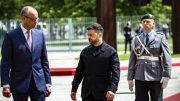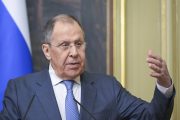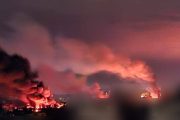
On January 16, European Commission President Ursula von der Leyen discussed a range of geopolitical and economic topics in a special address delivered at the World Economic Forum (WEF) Annual Meeting 2024 in Davos, Switzerland.
Citing the WEF’s Global Risks 2024 report, which alleged that the largest short-term risks the world may face over the next decade are “misinformation” and “disinformation,” von der Leyen posited that such “risks are serious because they limit our ability to tackle the big global challenges we are facing.”
Pointing out that people in countries across the world are heading to the polls in 2024 and a huge proportion of the global population will be affected by the results, the EC president said it was even more important to ensure that the “risks” from disinformation and misinformation are dealt with firmly.
Suggesting what could be done to deal with “misinformation” or “disinformation” risks, von der Leyen asserted, “This is not a time for conflicts or polarization. This is a time to build trust. This is a time to drive global collaboration more than ever before. This requires immediate and structural responses to match the size of the global challenges. I believe it can be done, and I believe that Europe can and must take the lead in shaping that global response.”
Moving on to the topic on the Russia-Ukraine conflict, von der Leyen contended that the West must not waver in supplying Ukraine with arms and money if it wants Kyiv to win its conflict against Russia.
“Ukraine can prevail in this war but we must continue to empower their resistance,” von der Leyen told business leaders, calling on Kyiv’s Western allies to continue their arms deliveries and financial support of Ukraine.
Moreover, the EC president claimed to “provide you with some real information” regarding the situation on the battlefield in Ukraine, alleging
Russia is failing on strategic goals. It is first and foremost a military failure. We haven’t forgotten that when Russia invaded Ukraine, many feared that Kyiv would fall in just a few days and the rest of the country within weeks. This did not happen. Instead, Russia has lost roughly half of its military capabilities. Ukraine has driven Russia out of half of the territories it had captured. Ukraine has pushed back Russia’s Black Sea fleet and reopened a maritime corridor to deliver grain to the world. And Ukraine has retained its freedom and its independence.
Subsequently, the EC president proceeded to allege that Moscow’s economy was a “failure” after its conflict with Ukraine.
“Russia’s failure is also economic. Sanctions have decoupled its economy from modern technology and innovation. Russia is now dependent on China.”
Von der Leyen’s remarks painting a rosy picture about Ukraine’s situation vis-a-vis Russia directly contradicts what NATO Secretary-General Jens Stoltenberg admitted that very same day at a WEF panel titled “Securing an Insecure World.”
Russia is advancing on many parts of the front in Ukraine, while Kiev’s summer offensive did not deliver the desired results, Stoltenberg acknowledged, describing the situation on the battlefield as “extremely difficult.”
“The Russians are now pushing on many front lines. And of course the big offensive that the Ukrainians launched last summer didn’t give the results we all hoped for,” he told WEF President Borge Brende.
“Russia is pushing hard. And this is serious and we should never underestimate Russia,” he elaborated.
Similarly, in December 2023, the secretary of Ukraine’s parliamentary national security committee, Roman Kostenko, said that the Ukrainian military needed 500,000 new conscripts to cover casualties and operate new units created during the next 12 months.
In an interview with the Ukrinform media outlet published last month, Kostenko bemoaned that his compatriots “thought that we would win soon,” which inculcated the belief in Ukrainians that “they could live quietly [and] not prepare for mobilization.”
“And now the words about an additional 450,000-500,000 mobilized have become a cold shower for everyone,” the lawmaker said. He added that the figure roughly reflects the armed forces’ needs in terms of replenishing “sanitary losses during the year” as well as forming new units. The military, according to Kostenko, must plan years ahead as the conflict “can … drag on for a long time.”
Additionally, Polish Deputy Foreign Minister Andrzej Szejna warned in an interview with the Rzeczpospolita news outlet on Monday that Poland must gear up to accept even more Ukrainian refugees from the conflict between Moscow and Kyiv.
Since the launch of Russia’s military operation in 2022, Poland has been one of Ukraine’s most vocal supporters in the EU. Besides providing arms and munitions, it has also welcomed an estimated 1.5 million Ukrainian refugees.
Newly-installed leftist Polish Prime Minister Donald Tusk, whose pro-EU coalition defeated the Law and Justice (PiS) party from power last month, has indicated that his government will not change this approach.
Szejna stated that the “fundamental reason” that Poland “cannot be burdened with additional responsibilities in the area of migration” is because it already is teeming with Ukrainian refugees.
“Although we wish the Ukrainians only victories, we cannot rule out that the Russian offensive will lead to a shift of the front to the west and cause millions of additional Ukrainians to arrive,” he said, noting that this development would be “a huge burden for our country” and insisting that “Polish society must be prepared for this.”
If Ukraine were retaining its “freedom and independence,” as von der Leyen claimed on January 16, why would Poland need to prepare for more Ukrainian refugees?
Furthermore, during the “Small Motherland — the Strength of Russia” forum in Moscow on Tuesday, Russian President Vladimir Putin stated that Ukraine’s much-touted counteroffensive has now “completely failed” and its very statehood would soon suffer an irreparable blow.
Putin pointed out that the head of Ukraine’s negotiation team, which participated in peace talks with Russia in the early months of the conflict, had recently conceded that Kyiv was at one point ready to reach an agreement with Moscow. Nonetheless, after a visit by then-British Prime Minister Boris Johnson, the Ukrainian authorities decided to stop pursuing a deal with Russia and continue fighting.
“Are they not idiots?” Putin asked, adding that if Ukraine had simply ignored Johnson, then the conflict could be long over by now. “This just proves yet again that they are not independent people,” the Russian leader said.
Similarly, in a recent interview with RBK, investor and former Soros Jim Rogers partner voiced his optimism about Russia’s economic future, notwithstanding Western sanctions imposed on Russia.
Rogers’ portfolio includes shares in major Russian companies such as PhosAgro, AFK Sistema, Aeroflot, and Moscow Exchange. Despite Western sanctions, Rogers articulated his commitment to holding onto these assets.
“I’m still optimistic. Russia has a good future in many aspects. I want to own Russian stocks; I don’t want to sell them,” Rogers emphasizes, highlighting his belief in the resilience and potential of the Russian market.
Echoing Rogers’ optimistic assessments of Russia’s economy was a January 10 article by Bloomberg stating that Russian oil companies were on track for record drilling at their oil fields last year and displayed no signs of harm from sanctions or the departure of some Western oil-field service providers.
From January to November last year, Russia drilled a total depth of 28,100 kilometers, the highest in over a decade, Bloomberg reported, citing industry records. Analysts from energy intelligence firm Kpler and Moscow-based consultancy Yakov & Partners expect that for the entire 2023 Russia’s production drilling will have surpassed 30,000 kilometers.
“Russia is substantially more independent in its oil-field services than generally appreciated,” said Ronald Smith, an oil and gas analyst at Moscow-based BCS Global Markets.
Also, if Ukraine were indeed a bastion of freedom and democracy as von der Leyen implied during her WEF speech, then perhaps President Volodymyr Zelensky would have some accounting to do regarding his persecution of the Ukrainian Orthodox Church (UOC) and confiscation of church property. Even Zelensky’s clampdown on the UOC prompted UN High Commissioner for Human Rights Volker Türk to sound the alarm that such actions were breaching rights to freedom of religion.
“I also note my concerns regarding freedom of religion and belief in Ukraine, given continuing action by the authorities against the Ukrainian Orthodox Church,” Türk said during a meeting of the UN Human Rights Council in Geneva, Switzerland last year.
“These proposed restrictions to the right of freedom of religion do not appear to comply with international human rights law,” Türk added.
The recent death of Chilean-American filmmaker and Zelensky critic Gonzalo Lira in a Ukrainian prison also does not augur well for Zelensky’s track record on “freedom” and “human rights.”
Lira’s father blamed his son’s death on the Joe Biden administration and its ties to Kyiv. The alleged persecution of the deceased Lira can be attributed to the fact that Lira had bravely reported on about a dozen Zelensky “opponents” who had “disappeared,” his father claimed.
Most strikingly, if Ukraine were winning in battles against Russia, why would Zelensky urge European countries to militarily intervene in Ukraine to fight Russia at this year’s WEF?
Regarding the Russia-Ukraine conflict, Zelensky said, “If anyone thinks this is only about us, this is only about Ukraine, they are fundamentally mistaken.”
“Possible directions and even timeline[s] of new Russian aggression beyond Ukraine become more and more obvious,” the Ukrainian leader continued.
“And if one must fight against Putin in the years ahead, isn’t it better to put an end to him and his war strategy now while our brave men and women are already doing it?”
In wake of all this, perhaps von der Leyen should get her feet on the ground amid the sobering political and military reality for the Kyiv regime in its conflict with Moscow, a reality backed with multiple admissions from top officials in the West and even in Ukraine itself.
Otherwise, perhaps she can expect to soon be labeled as a huge “disinformation” or “misinformation” risk.




